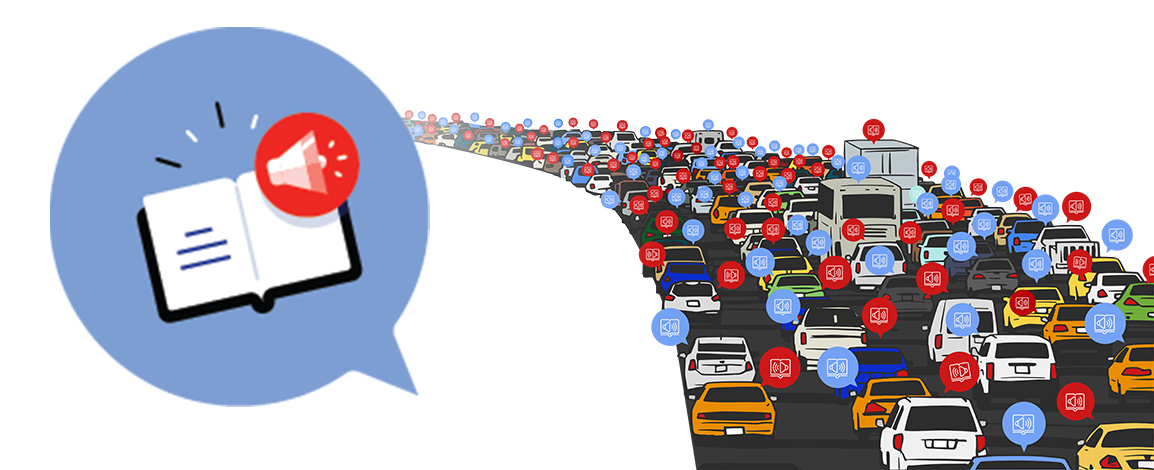
Short answer: Yes, it is. But the long answer is much more interesting!
By Dianne Coan, Division Director of Technical Operations
Tales as Old as Time
Storytelling is a tradition as old as human culture itself. Few would question the joy and power of a well-recited poem. Not to mention that listening to a book ensures you do not have to guess how to pronounce the main character’s name, and the voice artists who bring a book to life can do so with undeniable talent. But does the term “reading” accurately describe listening to a book or story?
The basic concept of an audiobook may have emerged at the same time as the first recording. The National Museum of American History notes that Thomas Edison recited a nursery rhyme in his first recording on the phonograph he invented in 1877 — creating the first ever spoken-word audio (“Spoken Word” is the GRAMMY awards category that now includes audiobooks). The question as to whether audiobooks count as “reading” likely followed soon after their creation.
However, that question may miss an important point; non-visual readers have been reading books aurally since at least 1934 when talking books were included in the National Library Service for the Blind and Print Disabled (NLS).** Perhaps more value can be found in considering these two related questions: Does time spent listening to a book replace visual reading time? And is comprehension the same?
Does Listening Time Replace Reading Time?
According to a 2019 Pew Study, the percentage of adults who read print or eBooks (i.e., visual readers) declined slightly from 2016. While a visual format remained the most-used by readers, the percentage of audiobook listeners rose during the same period — the only format to see an increase in use.
More readers are being drawn to audiobooks, often because the format allows the listener to do other things while enjoying a good book. A 2012 consumer survey asked audiobook listeners why they use the format. The top responses included being able to listen in the car, that it was portable, and that it allows them to multitask. The Panorama Project’s 2020 Immersive Media & Books report supported this finding, noting 70% of audio-readers multitask. More recently, Reddit users posting on the topic have offered suggestions for other types of multitasking most complementary to audiobook listening. Ideas include everything from folding laundry to working on a jigsaw puzzle. In light of these trends, one could conclude that audiobook listening is more likely to replace someone’s radio, music or podcast use than their visual reading.
Does Listening Affect Comprehension?
A 2016 study by Beth Rogowsky (et al.) found “no significant difference in comprehension between reading, listening, or reading and listening simultaneously” when comparing eBooks and eAudiobooks. That study concentrated on format (reading vs. listening), whereas an earlier 2010 study considered the content of the material, concluding that technical content (as opposed to narrative writing) in audio format did not match the reading comprehension of technical content in a written format.
The 2010 study focused more on podcasts than audiobooks, but one may deduce that listening to the more complicated technical parts of Daniel Kahneman’s Thinking Fast and Slow makes it more difficult to comprehend than, say, Michael Lewis’s Moneyball, which tells the story of the Oakland A’s baseball team’s use of Kahneman’s theories.
So, is listening to audiobooks considered reading? Yes. But perhaps the better question is: Are you a visual reader or an aural reader? Why not both?
Audiobook Narrators of Note
Not all audiobook narrators are created equal, at least in our view… well, hearing!
If you’re in search of great oral storytelling, check out titles presented by these narrators most loved by FCPL My Perfect Read advisors and selection staff. We know there are many more worth the listen, though, so tag us on social media to let us know your favorite narrator!
- Richard Armitage
- Scott Brick
- Ron Butler
- Morven Christie
- Ralph Cosham
- Sean Crisden
- Tim Curry
- Jim Dale
- Rupert Degas
- Jayne Entwistle
- Ari Fliakos
- Stephen Fry
- Neil Gaiman
- Robert Glenister
- Dion Graham
- George Guidall
- Jennifer Ikeda
- Rob Inglis
- Simon Jones
- Katherine Kellgren
- Lorelei King
- James Langton
- January LaVoy
- John Lee
- Adepero Oduye
- Robert Petkoff
- Ell Potter
- Kate Reading
- Barbara Rosenblat
- Rebecca Soler
- Bahni Turpin
- Simon Vance
- Channie Waites
- Gabra Zackman
*Learn more about storytelling and its ancient history from the ALA National Storytelling Network and in The Oldest True Stories in the World on SAPIENS.org
**Qualifying FCPL patrons can participate in the NLS talking books program through our Access Services branch.

